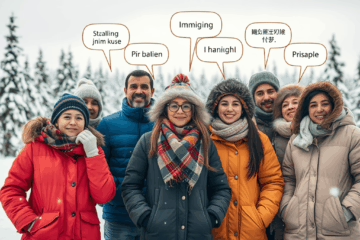Applying for a Canadian visitor visa can be a complex process, especially for applicants from countries like Iran. One of the critical aspects of the application is proving strong ties to one’s home country to assure immigration officials of the applicant’s intention to return after their visit. This article delves into the importance of demonstrating these ties, particularly focusing on family connections in Iran, employment ties to Canada, and the preparation of necessary documentation.
Table of contents
Understanding Strong Ties for Visitor Visas
When applying for a Canadian visitor visa, establishing strong ties to your home country is crucial. Immigration officials are tasked with ensuring that applicants intend to return to their home country after their visit. Strong ties can be defined as any significant connection to one’s home country that would compel them to return, such as family, employment, property, or social and cultural ties. For Iranian applicants, demonstrating these ties can be particularly important due to the geopolitical climate and the scrutiny that applications from certain countries may face.
The concept of strong ties encompasses several dimensions. It is not limited to familial connections but also includes economic, social, and cultural ties. Each of these aspects can serve as evidence of the applicant’s intention to return to Iran after their visit to Canada. The applicant must substantiate these ties with appropriate documentation that convincingly portrays their situation and intentions.
Understanding the nuances of what constitutes strong ties is essential for a successful visa application. Applicants should take a comprehensive approach, highlighting multiple facets of their life that connect them to Iran. This multifaceted presentation can create a compelling case that reassures Canadian immigration officials of the applicant’s commitment to return home.
Importance of Family Connections in Iran
Family connections are often one of the most compelling forms of strong ties to a home country. For Iranian applicants, emphasizing family ties can significantly strengthen a visitor visa application. Close family relationships, such as those with parents, siblings, or children, can be pivotal in demonstrating the applicant’s intention to return to Iran. These connections can be presented through official documents such as birth certificates, family registries, or affidavits.
In addition to immediate family, extended family ties can also play a crucial role. The presence of a supportive family network in Iran can provide a strong incentive for the applicant to return after their visit to Canada. This is particularly relevant in cultures where family plays a central role in daily life and personal identity. By illustrating the depth and importance of these relationships, applicants can effectively communicate their commitment to returning home.
Moreover, cultural obligations and responsibilities towards family in Iran can be highlighted as part of the application. These might include caring for elderly relatives, participating in family businesses, or being involved in significant family events. Such cultural ties can serve as a powerful testament to the applicant’s intention to return, reinforcing the narrative of their temporary visit to Canada.
Demonstrating Employment Ties to Canada
Employment ties are another critical component of proving strong ties to one’s home country when applying for a Canadian visitor visa. For Iranian applicants, demonstrating stable and ongoing employment in Iran can be a persuasive element of their application. Employment ties can be documented through employment contracts, salary slips, and letters from employers confirming the applicant’s position and the intention to return to work after the visit.
A stable job in Iran not only provides financial security but also indicates the applicant’s ongoing commitment to their professional life in their home country. This commitment can be further emphasized by detailing the applicant’s career trajectory, professional achievements, and future prospects within their current employment. Highlighting these aspects can underscore the applicant’s intention to maintain their professional life in Iran, reinforcing their temporary intent for visiting Canada.
For those applicants who are self-employed or own a business, providing evidence of business operations and responsibilities can be equally compelling. Financial statements, business licenses, and client contracts can serve as proof of the applicant’s economic engagement in Iran. Demonstrating a thriving business or professional practice can strongly indicate that the applicant has substantial reasons to return to Iran after their visit to Canada.
Preparing Documentation for Visa Application
Preparing the necessary documentation for a Canadian visitor visa application is a critical step in proving strong ties to Iran. Comprehensive and well-organized documentation can significantly enhance the credibility of the applicant’s case. It is essential for applicants to gather all relevant documents that substantiate their ties to Iran, such as family records, employment contracts, property deeds, and financial statements.
Each document should be up-to-date and, where necessary, translated into English or French by a certified translator. Accurate and clear documentation helps immigration officials quickly assess the applicant’s situation, reducing the likelihood of delays or misunderstandings. Applicants should ensure that all documents are consistent and accurately reflect their personal and professional circumstances.
In addition to official documents, applicants may consider including personal statements or letters explaining their reasons for visiting Canada and their intention to return to Iran. These statements provide an opportunity to convey personal motivations and commitments that may not be fully captured by official documents alone. A well-prepared application package, combining both official documentation and personal narratives, can effectively demonstrate the applicant’s strong ties to Iran and support their case for a Canadian visitor visa.
In conclusion, proving strong ties to Iran is a pivotal aspect of applying for a Canadian visitor visa. By thoroughly understanding the importance of family connections, employment ties, and the preparation of comprehensive documentation, Iranian applicants can present a compelling case to Canadian immigration officials. Successfully demonstrating these ties not only strengthens the application but also increases the likelihood of obtaining a visa, allowing applicants to explore Canada while ensuring their return to their home country.
Frequently Asked Questions
FAQs: Proving Strong Ties for Canadian Visitor Visa
1. What are strong ties in a Canadian visitor visa application?
Strong ties refer to significant connections to your home country, such as family, employment, property, or social and cultural ties, which demonstrate your intention to return after visiting Canada.
2. Why are strong ties important for a visitor visa application?
Strong ties assure immigration officials that the applicant intends to return to their home country after their temporary visit to Canada.
3. What types of ties are considered strong ties?
Family connections, employment stability, property ownership, financial investments, and cultural or social obligations are considered strong ties.
4. How can family connections strengthen my visitor visa application?
Family connections demonstrate your emotional and cultural obligations to your home country, making it more likely you will return after your visit.
5. What documents can prove family ties?
Documents such as birth certificates, family registries, marriage certificates, and affidavits can be used to prove family ties.
6. Can extended family ties help in proving strong ties?
Yes, extended family ties can also demonstrate a supportive network that strengthens your connection to your home country.
7. How can employment ties be demonstrated in a visa application?
Provide evidence like employment contracts, salary slips, letters from employers, and proof of ongoing job responsibilities.
8. What if I am self-employed? How can I prove strong ties?
If you are self-employed, provide business licenses, financial statements, and client contracts as evidence of your commitment to your business.
9. Can property ownership strengthen my application?
Yes, owning property in your home country can demonstrate financial stability and a reason to return after your visit to Canada.
10. Is it necessary to include translated documents?
Yes, all documents should be translated into English or French by a certified translator if they are in another language.
11. How can I highlight my cultural ties?
You can mention obligations like participation in cultural events, religious responsibilities, or community involvement.
12. Can a letter of explanation help my application?
Yes, a personal letter explaining your reasons for visiting and your intention to return can complement official documentation.
13. What should be included in a letter of explanation?
Include your reasons for visiting Canada, your ties to your home country, and your planned activities during your visit.
14. What is the role of financial stability in proving strong ties?
Financial stability demonstrates that you have sufficient resources and commitments in your home country to compel your return.
15. Can a temporary visa refusal impact my chances?
A refusal can impact future applications, but addressing the reasons for refusal and strengthening your ties can improve your chances.
16. How can I demonstrate my intention to return home?
Provide clear evidence of your obligations, such as family responsibilities, employment, and property ownership in your home country.
17. Are there specific requirements for Iranian applicants?
Iranian applicants should emphasize strong family and cultural ties, given the scrutiny often applied to applications from certain countries.
18. What role does employment stability play in proving strong ties?
Employment stability indicates a long-term commitment to your professional life, which is a strong reason to return home after your visit.
19. Can participation in family businesses be included?
Yes, involvement in a family business can be a strong indicator of your ties to your home country.
20. How can cultural obligations be documented?
You can provide evidence of religious activities, community service, or participation in traditional events.
21. What if my family is traveling with me?
If your family is traveling with you, emphasize your ties to your extended family or other responsibilities in your home country.
22. Can property ownership abroad affect my application?
It depends, but demonstrating ownership of property in your home country usually strengthens your application.
23. Should I include details about my financial situation?
Yes, providing bank statements, proof of income, and other financial documents helps demonstrate stability.
24. How do I prove ties to my community?
Include documents like membership in clubs, organizations, or proof of participation in community events.
25. Can I apply again if my visa is denied?
Yes, but ensure you address the reasons for the previous denial and provide additional evidence of strong ties.
26. Is there a specific format for visa documentation?
There is no strict format, but ensure documents are well-organized, up-to-date, and certified where necessary.
27. How do property deeds prove ties?
Property deeds show financial investment and a permanent connection to your home country.
28. How should I present my employment details?
Provide a detailed letter from your employer, along with salary slips and contracts to prove ongoing employment.
29. What role does education play in proving ties?
If you are a student, proof of enrollment and a letter from your institution can demonstrate your intention to return to continue your studies.
30. Are notarized documents required?
Notarization is not always required but can add credibility to certain documents like affidavits or personal statements.
Discover more from Pax Law Corporation
Subscribe to get the latest posts sent to your email.



0 Comments